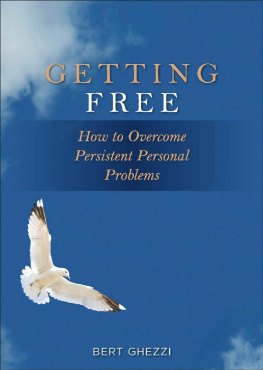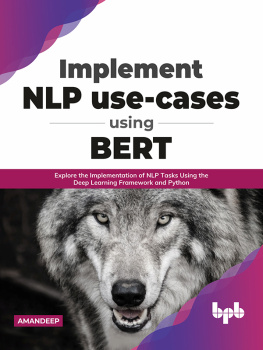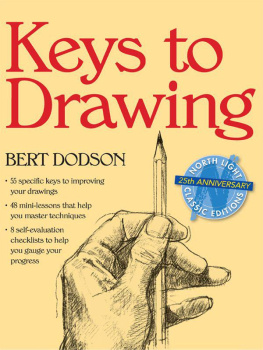Bert Ghezzi - Getting Free
Here you can read online Bert Ghezzi - Getting Free full text of the book (entire story) in english for free. Download pdf and epub, get meaning, cover and reviews about this ebook. year: 2012, publisher: Sophia Institute Press, genre: Religion. Description of the work, (preface) as well as reviews are available. Best literature library LitArk.com created for fans of good reading and offers a wide selection of genres:
Romance novel
Science fiction
Adventure
Detective
Science
History
Home and family
Prose
Art
Politics
Computer
Non-fiction
Religion
Business
Children
Humor
Choose a favorite category and find really read worthwhile books. Enjoy immersion in the world of imagination, feel the emotions of the characters or learn something new for yourself, make an fascinating discovery.
- Book:Getting Free
- Author:
- Publisher:Sophia Institute Press
- Genre:
- Year:2012
- Rating:3 / 5
- Favourites:Add to favourites
- Your mark:
- 60
- 1
- 2
- 3
- 4
- 5
Getting Free: summary, description and annotation
We offer to read an annotation, description, summary or preface (depends on what the author of the book "Getting Free" wrote himself). If you haven't found the necessary information about the book — write in the comments, we will try to find it.
Getting Free — read online for free the complete book (whole text) full work
Below is the text of the book, divided by pages. System saving the place of the last page read, allows you to conveniently read the book "Getting Free" online for free, without having to search again every time where you left off. Put a bookmark, and you can go to the page where you finished reading at any time.
Font size:
Interval:
Bookmark:
Getting Free
How to Overcome Persistent Personal Problems
Bert Ghezzi
SOPHIA INSTITUTE PRESS
Manchester, New Hampshire
Getting Free: How to Overcome Persistent Personal Problems was originally published in 1982 by Servant Books, Ann Arbor, Michigan, with a different subtitle. This 2001 edition by Sophia Institute Press includes additions and slight revisions to the original text.
Copyright 1982; 2001 Bert Ghezzi
Scripture quotations are from the Revised Standard Version of the Bible, Copyright 1946, 1952, 1971, 1973, and from the New American Bible, Copyright 1970 by the Confraternity of Christian Doctrine, Washington, D.C.
Printed in the United States of America
All rights reserved
Jacket design by Lorraine Bilodeau
On the cover: Text to come.
No part of this book may be reproduced, stored in a retrieval system, or transmitted in any form, or by any means, electronic, mechanical, photocopying, or otherwise, without the prior written permission of the publisher, except by a reviewer, who may quote brief passages in a review.
Sophia Institute Press
Box 5284, Manchester, NH 03108
1-800-888-9344
www.SophiaInstitute.com
Getting free : how to overcome persistent personal problems / Bert Ghezzi.
p. cm.ISBN 1-928832-24-5 (pbk. : alk. paper)01 02 03 04 05 06 07 10 9 8 7 6 5 4 3 2 1
Also by Bert Ghezzi:
Being Catholic Today
Voices of the Saints: A Year of Readings
50 Ways to Tap the Power of the Sacraments
Guiltless Catholic Parenting from A to Y*
Keeping Your Kids Catholic

Preface
This past week I read Getting Free for the first time since I wrote it twenty years ago. As I read, I smiled a little at the confidence and authority I heard in my own voice teaching about overcoming persistent problems. Thats because some of my own problems irritability, anger, and the tendency to be judgmental, to name a few prominent ones have persisted, and I still have to fight them with all the spiritual energy God gives me. When I put the book down, however, I thought that the ideas in it were still sound and useful.
I say this to caution you that although the strategy I describe here works for overcoming evil influences we find within our hearts, it doesnt always eliminate them.
Unless God intervenes miraculously, some temptations of the flesh stay with us and require us to fight them throughout our lives. So although the strategy presented in Getting Free will help you to find release from some big problems, it doesnt offer deliverance from all persistent problems only a wise, practical way to deal with them and to stay on top of them.
While I updated and slightly revised the text, I decided not to tamper with the examples in the original book, many of which I drew from my family. The children you meet, for example, in the books opening story, have grown up. As you might suspect, their problems have persisted. The big tease, who appears on page 7, is now a prosecuting attorney, and he still delivers witty but devastating one-liners. I plan to give him and all of my children a copy of this book with the hope that they will read it and apply its teaching in their lives.
You can read Getting Free as a how-to book of things you must do to overcome persistent problems. But using it only that way may make matters worse by putting pressure on you to accomplish something humanly impossible. Or you can read it as an opportunity to open yourself up to the marvelous action of the Holy Spirit and let Him accomplish what is divinely possible: setting you free to deal with your problems and conquer them.
Bert Ghezzi
December 2000
Part One

Recognizing the Problem
Chapter One

Identify your persistent personal problems
My twelve-year-old daughter, Elaine, loves horses. Recently she has been negotiating a trade with me: horseback riding lessons for violin. (She doesnt know it, but my natural reaction against listening to violin exercises is a point in her favor.) Horses are often the subject of conversation in our house. Ruths horse, I heard Elaine telling her mother, is seven-eighths Arabian, I think. Just then her brother passed through the kitchen. Perfectly imitating her tone and cadence, he chirped wickedly, Elaine is seven-eighths shrimp, I think. My poor wife laughed before she could catch herself.
Teasing of this sort has been a common problem in my family. The young man who delivered the above-quoted line is a master of the art. He seems to be made of the stuff that produces the likes of Bob Hope, those who are famous for dropping negative, although outrageously funny, one-liners. But our stand-up comedian, after many lectures and some parental applause (clapping one flat stick against a childs posterior), has come to regard his teasing as a problem. He has resolved a number of times to stop. Invariably, he has slipped and stung one of us. I have a problem with teasing, dont I, Dad? he asked me once. Well, I try to stop, but I cant. I guess something in me keeps making me do it.
My son is not alone in his plight. Many Christians have problems they think they cant overcome. Sometimes their problems crop up after theyve experienced a genuine spiritual renewal. What a terrible irony: to be filled with the Holy Spirit and to be plagued with apparently incurable problems! Is there a Christian who hasnt echoed my sons complaint: I try to stop but something in me keeps making me do it?
Most people have some emotional difficulties such as anger, self-condemnation, unruly desires, or fears. Many have faults or weaknesses that must change. All are sinners. Consider the following real-life examples.

Anger and anxiety may trouble us
Tom and Sally, both active members of their parish, were married two years ago. As single people, they had been regarded as model young Christian adults. Nonetheless, these fine young people had a very difficult time adjusting to married life. Major changes in a persons life, such as marriage, often flush out problems that have been hidden below the surface.
Sally, who had been very active in parish groups, felt that Toms desire for her to spend more time at home was selfish. It deprived her of her ministry. In addition, Toms tendency to make snap decisions and his constant, low-level irritability made Sally fearful for their future relationship. It didnt take long before her worries swelled into full-fledged anxiety.
Tom had always been a little capricious. He had a long-standing problem with irritability. He interpreted Sallys difficulty with his impulsive decision-making as unwarranted criticism. He felt pressured by her resistance to his desire for her to stay at home more. As a result, his irritability grew worse until it sparked frequent arguments between them.
Tom and Sally knew they had problems. They both tried to stop. Neither could. Something seemed to prevent them from changing.
Toms irritability and Sallys anxiety are examples of emotional problems. Modern Christians seem to have more problems with their emotions than Christians of earlier say, for example, New Testament times. Our functionalized society compels us to place a very high value on intimacy, and feelings are among our most intimate parts. Our whole environment prepares us to pay keen attention to how we feel. But the more attention we pay to our emotions, the more problems we find or make for ourselves.
Dont misunderstand. As Christians, we shouldnt model ourselves on stoics, striving to be free from our feelings. Instead, we should model ourselves on Jesus and His disciples. We should try to do everything with feeling: get angry, cry at funerals, leap for joy. But the modern tendency to overemphasize feelings creates a host of problems for us.
Next pageFont size:
Interval:
Bookmark:
Similar books «Getting Free»
Look at similar books to Getting Free. We have selected literature similar in name and meaning in the hope of providing readers with more options to find new, interesting, not yet read works.
Discussion, reviews of the book Getting Free and just readers' own opinions. Leave your comments, write what you think about the work, its meaning or the main characters. Specify what exactly you liked and what you didn't like, and why you think so.










